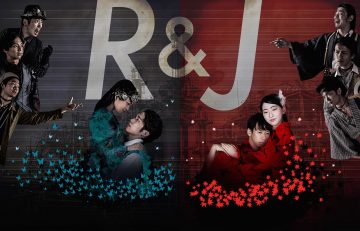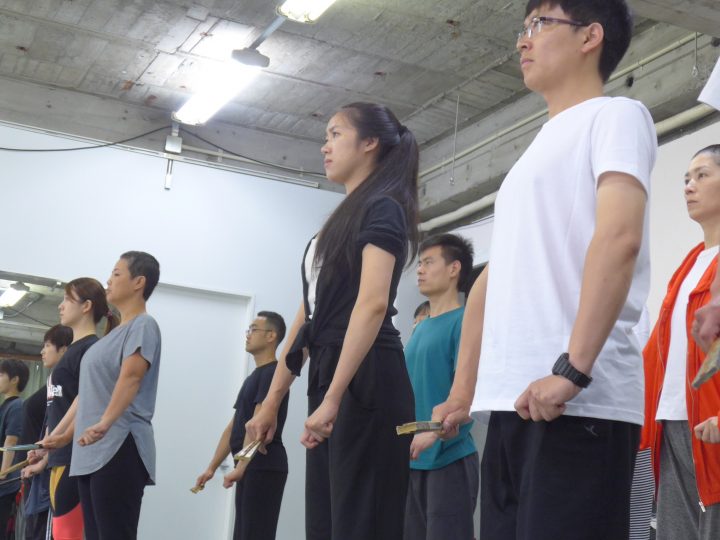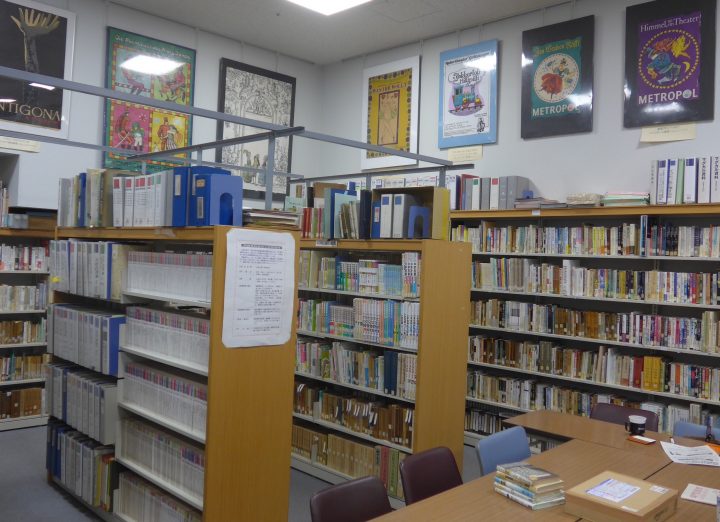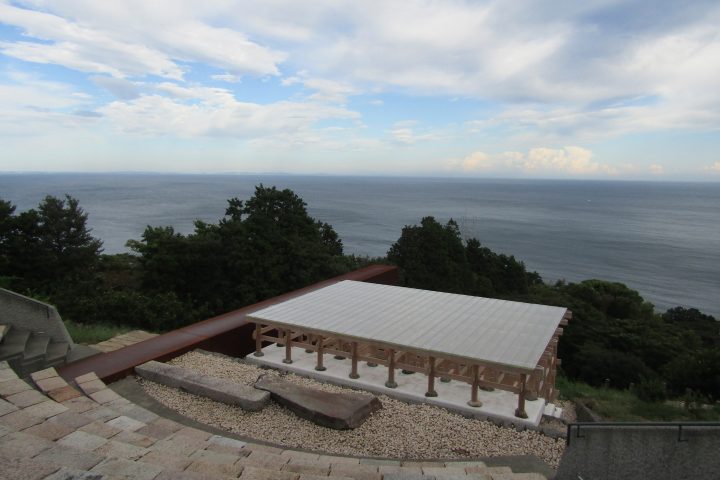Kanagawa Prefectural Youth Center's efforts to support the performing arts by developing talent and providing venues
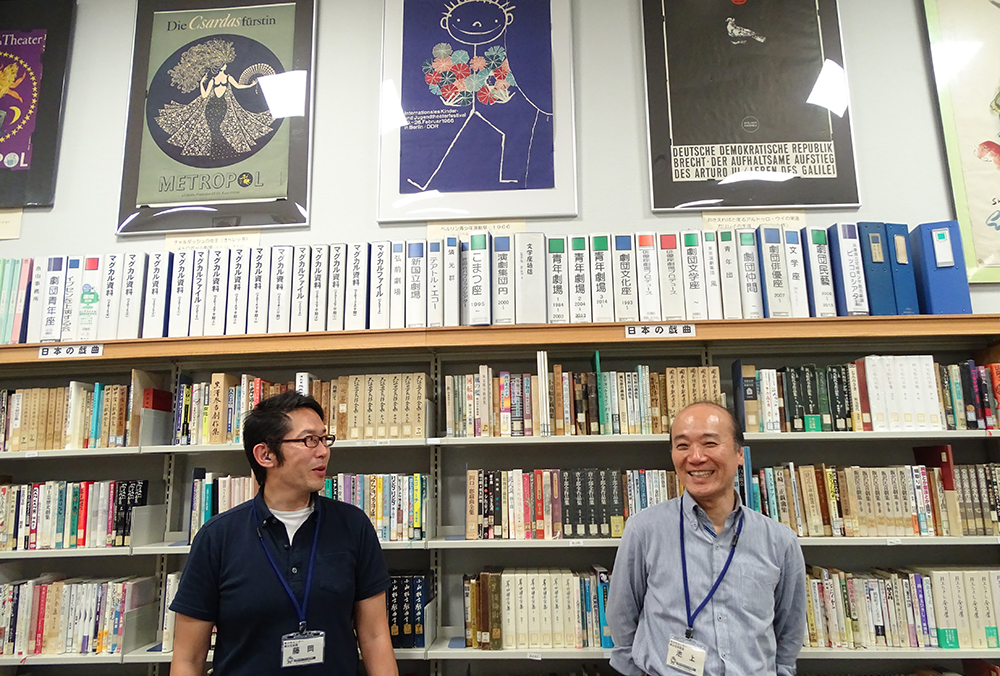
The Youth Center is an "open zone for youth culture"
--In addition to youth programs, the Youth Center also supports performing arts activities. What is the purpose of this?
Ikegami : Our main duty is the healthy development of young people. The Youth Center is also a place for youth development and an "open area for youth culture." It functions as a place that can be freely used for practicing and presenting performances such as theater, dance, and music.
In the midst of all this, Kanagawa Prefecture began its "Magcul" initiative in 2013. "Magcul" is an abbreviation for "Magnet Culture," which means that Kanagawa's culture itself acts as a magnet, attracting people and bringing charm and bustle to the city. With the link between "Magcul" and the Youth Center, efforts related to the performing arts are expanding even further.
--Specifically, what kind of initiatives are you involved in?
Fujioka : "Magcul" has many aspects, such as promoting culture and the arts, focusing on performing arts, creating a lively town, unearthing the charm of the region, and developing human resources. Among these, the Youth Center is responsible for human resource development.
Ikegami : These are the four pillars. First, "Magcal Friday." This is an initiative to lend out the facilities and equipment of the Multipurpose Plaza for free every Friday for theatrical and musical performances. Second, "Magcal Theater." This allows you to use the Multipurpose Plaza for free for one week. Third, "Theater School for Young People." In order to allow young people from high school students to 29 years old to enjoy making plays, they not only act but also make the props and costumes themselves, and hold a main performance in August. And fourth, "High School Theater Festival." In order to support school theater, plays that have performed well in the high school theater prefectural competition are open to the public.
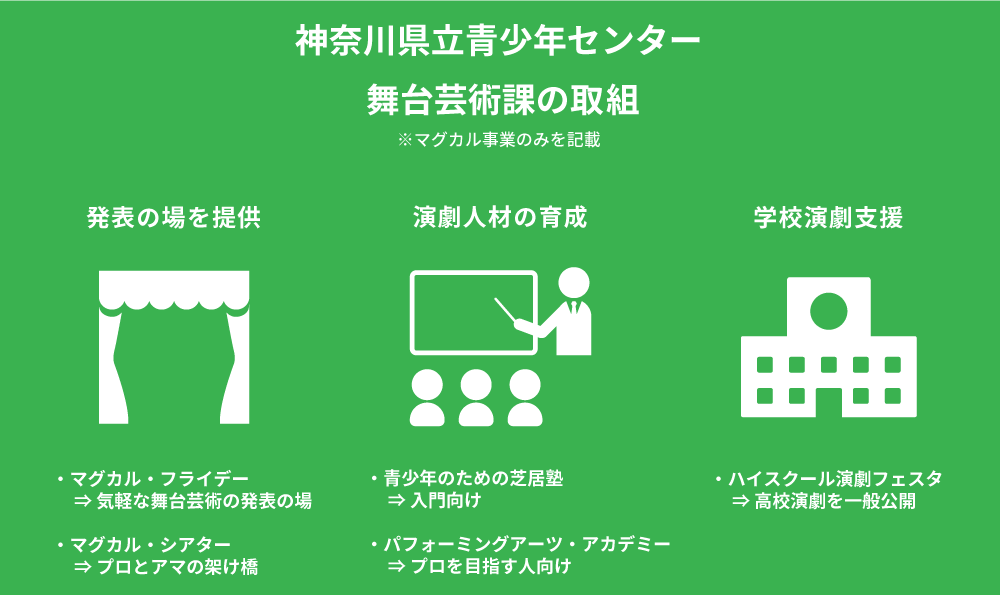
Fujioka : Governor Kuroiwa says he wants to turn Kanagawa into a Broadway. However, it is not so easy to increase the number of theaters. So, four years ago, the prefecture launched "MAGCUL.net," a virtual Broadway, and decided to start "Magcal Friday" and "Magcal Theater." The Apollo Theater, the home of Broadway, continues to hold "Amateur Night" to discover new talent. It has produced many stars so far and has become a gateway to success in the entertainment industry. "Magcal Friday" and "Magcal Theater" also started from this idea.
In the first place, the Youth Center has been working on theater-related activities for over 50 years since its opening, even before "Magcal" started. "Magcal" did not start everything new, but rather incorporated new ideas into the original initiatives, resulting in the current lineup.
--So you support the performing arts through both training talent and providing venues.
Ikegami : For example, at the Kanagawa Arts Theater, long-running performances by the Shiki Theatre Company and plays directed by Akira Shirai are held. Inviting such top artists is also part of "Magcul," but the Youth Center plays a role in broadening the base of performing arts. Young people who think "it's difficult to rent a theater by ourselves" can easily use the Youth Center. We hope that they will use the Youth Center as a place to present theater, music, dance, and other performances to improve their skills.
Fujioka : We may recommend to KAAT groups that have produced works that we think are "this" from among the performances at the "Magcal Theater". The group's performance may be realized at KAAT the following year. There are still many challenges, but we aim to create a cycle in which young talent will be developed through the efforts of the "Magcal Theater", and some of them will step up to KAAT and other institutions as professionals and grow further.
Ikegami : We also provide technical support to the backstage staff. Last year and this year, we held a scriptwriting course and a props course. Students rarely have the opportunity to learn how to make props. So we held a workshop where students could actually hold a hammer and make props.
Aiming to develop talent to lead the prefecture's performing arts
--In 2014, the "Magcal Performing Arts Academy" was launched to train musical actors. Please tell us the difference between this and the "Theater School for Young People."
Ikegami : "Theater School" is a citizen-participation theater project that allows people to experience the sense of accomplishment of being on stage. It's a place where people can discover for the first time that "theater is so much fun." It may be a big hurdle to suddenly join a theater company, but this is something you can easily participate in. On the other hand, the "Academy" aims to nurture talent that will lead the performing arts in Kanagawa Prefecture.
--How have the results been?
Ikegami : It's difficult to define what constitutes success... However, the Academy is already producing students who are active in movies, theater, and television. Students who were not good at it when they first enrolled have made remarkable progress, and apparently production people who saw the results presentation in April of this year approached them.
Fujioka : You're still young, so you have a lot of room to grow. Just like in sports, there's a rapid growth curve.
Ikegami : We will hold a main performance in August which will include a paid performance, and next year we plan to stage a new work by the school's principal, Yokouchi Kensuke, so I think that's where the true value of the Academy will be tested.
It is true that it will be difficult for all of the students to become TV stars. However, I think it would be a great achievement if the graduates of the Academy go on to become instructors in the performing arts in Kanagawa Prefecture and to nurture the next generation of talent. New students have joined us this year, and we currently have 34 students working hard. Some students have decided to enroll after seeing the results presentation in April. This could also be considered an achievement of the Academy.
--What kind of response have you received from other initiatives?
Ikegami : The number of groups applying for "Magcal Friday" and "Magcal Theater" is increasing. It seems that the content of the performances is also gradually improving. I guess they grow by being exposed to a lot of people. We also hold university theater competitions, and through these connections, people have started new theater companies, and interactions between people involved in performing arts have also been born.
Fujioka : The Youth Center also has a theater reference room . It is a specialized theater library with over 10,000 theater materials. What makes this facility unique nationwide is that it also lends out materials to outside the library, and its operation is supported by the enthusiasm of volunteer staff. We often see students in the drama club choosing scripts with advice from the reference room staff. We recognize that providing several entry points into the performing arts for young people is an important initiative for our library. We would be happy if we can play a role in supporting school theater as part of that.
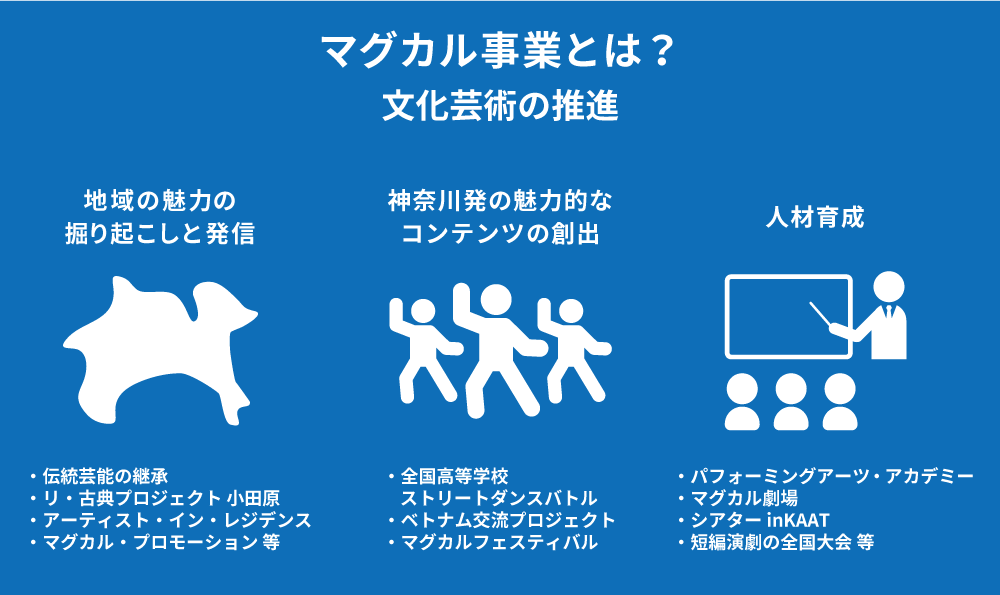
I want to lower the barrier to performing arts and increase the audience.
--Please tell us about the future prospects for the Youth Center.
Ikegami : We will continue our efforts as an "open zone for youth culture". School plays for junior and senior high school students are supported by schools and federations as club activities, but there have been no efforts to develop or support university students or young actors in their 20s. I think that we have been able to provide some support through the "Magcal Theater" and other programs. We hope to continue to play the role of a youth center and be a place where young people can engage in performing arts activities.
Fujioka : The Kanagawa Arts Theatre, which is also a prefectural facility, serves as a place for creative activities with top-level artists, but the role of the Prefectural Youth Center could be said to be to lower the barrier to performing arts and allow young people and novices to experience the joy of performing arts.
Our purpose in existence is to provide a venue for performances in the face of a decline in facilities in the prefecture, such as the Sotetsu Honda Theater and the Prefectural Women's Center Hall, to raise awareness of the greatness of school theater, and to support the performing arts by nurturing talent. If amateurs, including young people, are not nurtured, the flame of the professionals at the top will also go out. We want to continue doing what we can to keep this flame burning.
Ikegami : By lowering the threshold for performing arts, we want to increase the number of viewers as well as actors and staff. It may be difficult to pay 10,000 yen for a ticket, but you can easily enjoy a performance at the "Magcal Theater" or a student theater. High school theater is really interesting. It's a big mistake to think that it's amateur theater because it's at an amateur level. There are many works with strong messages that will make you groan. I hope many people will come and experience a part of performing arts.
– – –
